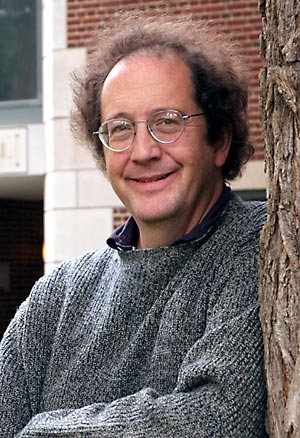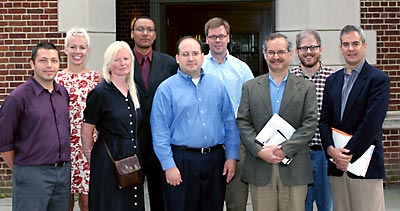Princeton Weekly Bulletin November 21, 2005, Vol. 95, No. 10 search prev next
University Center for Human Values names visiting faculty, fellows
Princeton NJ — The University Center for Human Values and the Program in Ethics and Public Affairs have named their roster of visiting faculty and fellows for 2005-06. The visitors are devoting a year’s residence at Princeton to research, writing and teaching about ethics and human values.

Walter Sinnott-Armstrong
Laurance S. Rockefeller Visiting Professor for Distinguished Teaching
Walter Sinnott-Armstrong is a professor of philosophy and the Hardy Professor of Legal Studies at Dartmouth College. His research interests include ethics, philosophy of law, epistemology and informal logic. He is the author, with William Lane Craig, of “God? A Debate Between a Christian and an Atheist” and the forthcoming “Moral Skepticisms.” Sinnott-Armstrong also is editing three volumes in a series on “Empirical Moral Psychology: Morals in the Brain,” “The Evolution of Morality” and “Morality and Cognitive Science.” While at Princeton, he is writing a book on the many ways in which contemporary neuroscience affects the understanding of moral judgment and action. This fall, he is teaching an undergraduate course, “Normative Ethics,” in the Department of Philosophy and the University Center for Human Values.
Harold T. Shapiro Postdoctoral Fellow in Bioethics
Nir Eyal holds for a second year the Harold T. Shapiro Postdoctoral Fellowship in Bioethics. Previously, he was a postdoctoral fellow in bioethics at the National Institutes of Health. He received his M.A. in philosophy from the Hebrew University of Jerusalem and his D.Phil. in politics from Oxford University. Eyal is writing a book that develops a consequentialist approach to respect for persons and examines the implications of that approach for political theory and for bioethics. In 2004-05, he taught a graduate course, “Respect for Persons and Consequentialism,” in the departments of politics and philosophy. He will teach a freshman seminar this spring on “Deciding for Others,” and also is continuing to coordinate the DeCamp Bioethics Seminars with Professor Peter Singer.
Postdoctoral Fellow in Democracy and Human Values
Christopher Karpowitz’s research intersects political behavior and political theory, and he has developed special interests in deliberation, democratic theory, civic engagement, political psychology and American political thought. His dissertation, “Having a Say: Public Hearings, Deliberation and Democracy in America,” explores how citizens experience and perceive political institutions and democratic processes, focusing on both traditional public hearings and reforms designed to foster greater deliberation. He is co-author of “Democracy at Risk: How Political Choices Undermine Citizen Participation, and What We Can Do About It,” and his work is forthcoming in several venues, including “The Deliberative Democracy Handbook” (with Jane Mansbridge), “Can the People Decide?” (with Tali Mendelberg) and the British Journal of Political Science. Karpowitz received an M.A. and Ph.D. from Princeton, where he was named to the fellowship of Woodrow Wilson Scholars and was an affiliate graduate student at the Center for the Study of Democratic Politics.

Pictured with Stephen Macedo (right), director of the University Center for Human Values and the Laurance S. Rockefeller Professor of Politics and Human Values, are this year’s visitors (from left): Nir Eyal, Anne Eaton, Angelika Krebs, Tommie Shelby, Christopher Karpowitz, John Oberdiek, Paul Guyer and Ron Mallon. (Photo: Denise Applewhite)
Laurance S. Rockefeller Visiting Fellows
Anne Eaton is an assistant professor of philosophy at the University of Illinois-Chicago. Her areas of research are value theory, philosophy of art, feminism and ethics. Among the topics of interest to her are representations of rape. She currently is working on a project that investigates the intersection of ethics with the visual arts and its implications for museum practices and public policy.
Paul Guyer is a professor of philosophy and, since 1991, the Florence R.C. Murray Professor in the Humanities at the University of Pennsylvania. He also has been a visiting professor at Harvard and Princeton. He is the author of six books on Immanuel Kant. During his fellowship year at Princeton, he is writing a history of modern aesthetics. One of its central themes will be the continuing engagement of modern aesthetics with the age-old question of the relation between aesthetic experience and morality.
Angelika Krebs is a professor of philosophy at the University of Basel, Switzerland. Her interests include social and political philosophy, applied ethics and the philosophy of language. She has published books on the critique of equality; on work, family and basic income; and on environmental ethics. During her fellowship year at Princeton, she is working on a book titled “Dialogical Love.”
Ron Mallon is an assistant professor of philosophy at the University of Utah. He also has held a research assistant professorship at the University of Hong Kong. His research is centered on issues at the intersection of culture and the mind. During his year at the University Center for Human Values, he is working on a book exploring the social construction of human kinds.
John Oberdiek is an assistant professor of law at Rutgers University School of Law in Camden and an associate member of the Rutgers graduate faculty in the Department of Philosophy in New Brunswick. He works in legal, moral and political philosophy, as well as in tort and administrative law. His work at Princeton focuses on normative aspects of risk, in particular on the moral significance of risk and the articulation of standards of risking and risk regulation. Oberdiek also is a fellow in the Program in Ethics and Public Affairs.
Tommie Shelby is the John L. Loeb Associate Professor of the Social Sciences at Harvard University, where he is a faculty member of the Department of African and African American Studies and the Committee on Degrees in Social Studies. His research interests include political philosophy and social theory, especially issues of race, economic inequality and social justice. While at Princeton, he is investigating the moral and political implications of racial and class divisions in modern societies, especially in the United States.
For more information, visit the University Center for Human Values Web site at www.princeton.edu/~uchv.

